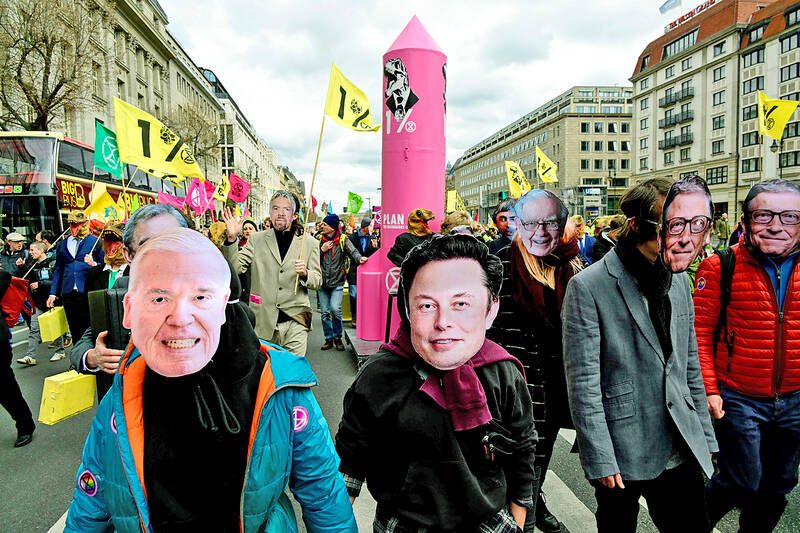When the iconic US diaper company Huggies was swamped with false pedophilia allegations last month, the conspiracy was traced to a once-banned influencer reinstated to Twitter by Elon Musk. The Tesla tycoon bitterly denies that misinformation has surged since his turbulent US$44 billion acquisition of the messaging platform, but experts say content moderation has been gutted after mass layoffs, while a paid verification system has served to boost conspiracy theorists.
Adding to the turmoil, the self-proclaimed free speech absolutist has restored what one researcher estimates are over 67,000 accounts that were once suspended for a myriad of violations, including the incitement of violence, harassment and misinformation.
Among those reinstated is Vincent Kennedy, a supporter of the QAnon conspiracy movement who was banned from Twitter after the Jan. 6, 2021, attack on the US Capitol.

Photo: AFP
Kennedy, according to the advocacy group Media Matters, launched a conspiracy theory in late last month that left the Huggies diaper brand fighting off extraordinary pedophilia accusations.
He posted a picture of a Disney-themed diaper featuring Simba, a character from The Lion King, and circled triangles and spiral swirls that were part of the design.
This was to illustrate a widely debunked conspiracy theory that the shapes are recognized by the FBI as coded signals used by pedophiles.
“Once you truly awake you ain’t going back to sleep,” Kennedy wrote in the tweet that garnered millions of views.
The conspiracy theory spread like wildfire to other platforms like TikTok. Huggies, which is owned by Kleenex-owner Kimberly-Clark, then faced an avalanche of hate messages and calls for a boycott.
Huggies sought to douse the flames, writing in a direct response to Kennedy’s tweet that its designs were nothing more than “fun and playful” and that it takes “the safety and well-being of children seriously.”
But conspiracy theorists jumped on the response to further amplify the false claim.
‘REAL-WORLD HARM’
Anecdotally, there’s no doubt that the flood of toxic content from repeat offenders Elon has re-platformed is driving real-world harm,” said Jesse Lehrich, cofounder of the advocacy group Accountable Tech.
“When you reinstate the architects of the Jan. 6 insurrection as democracy teeters on the brink, when you give a massive platform to notorious neo-Nazis amidst a surge in anti-Semitism, when you re-platform influential purveyors of medical disinformation in the middle of a pandemic, there are going to be real-world consequences.”
Travis Brown, a software developer based in Berlin, has compiled an online list of more than 67,000 restored Twitter accounts since Musk’s takeover in late October. Brown said that the list was incomplete and the actual number of restored accounts could be higher.
In a recent BBC interview, Musk pushed back at allegations that misinformation and hateful content were seeing a resurgence since his takeover.
He accused the interviewer of lying.
“You said you see more hateful content, but you can’t even name a single one,” Musk said.
Experts named dozens of examples — including posts by anti-vaccine propagandists, neo-Nazis and white supremacists.
After his account was restored, election conspiracy theorist Mike Lindell called on his followers to “melt down electronic voting machines” and use them as prison bars.
Anti-LGBTQ+ narratives — including the false claim that the community “grooms” children — have spiked on the platform, according to the Center for Countering Digital Hate (CCDH).
One key driver of the “grooming” narrative, the group said, is conspiracy theorist James Lindsay, whose account was recently restored after previously being banned permanently.
‘HATEFUL RHETORIC’
The reinstatements increase hateful rhetoric across the platform, creating a culture of tolerance on Twitter — tolerance to misogyny, racism, anti-LGBTQ tendencies,” said Nora Benavidez, from the nonpartisan group Free Press.
Imran Ahmed, chief executive at CCDH, said “Twitter is monetizing hate at an unprecedented rate.” Just five Twitter accounts peddling the “grooming” narrative generate up to US$6.4 million in annual advertising revenue, according to CCDH’s research.
But experts say the strategy is counterproductive as that can hardly offset lost advertising revenue. The chaotic shake-up under Musk has scared off several major advertisers. Twitter’s ad income will drop by 28 percent this year, according to analysts at Insider Intelligence, who said “advertisers don’t trust Musk.”
As an alternative, Musk has sought to boost income from a verification checkmark, now available for US$8 in a program called Twitter Blue. But dozens of “misinformation super-spreaders” have purchased the blue tick and are inundating the platform with falsehoods, according to the watchdog NewsGuard.
“Musk reinstated accounts to make money and to adopt what he believes, misguidedly, is some ‘equal free speech’ mindset — ignoring that the (policy) makes Twitter a platform which rewards violent language with visibility,” Benavidez said.
“This chills speech and engagement rather than furthers it.”

Growing up in a rural, religious community in western Canada, Kyle McCarthy loved hockey, but once he came out at 19, he quit, convinced being openly gay and an active player was untenable. So the 32-year-old says he is “very surprised” by the runaway success of Heated Rivalry, a Canadian-made series about the romance between two closeted gay players in a sport that has historically made gay men feel unwelcome. Ben Baby, the 43-year-old commissioner of the Toronto Gay Hockey Association (TGHA), calls the success of the show — which has catapulted its young lead actors to stardom -- “shocking,” and says

The People’s Republic of China (PRC) invaded Vietnam in 1979, following a year of increasingly tense relations between the two states. Beijing viewed Vietnam’s close relations with Soviet Russia as a threat. One of the pretexts it used was the alleged mistreatment of the ethnic Chinese in Vietnam. Tension between the ethnic Chinese and governments in Vietnam had been ongoing for decades. The French used to play off the Vietnamese against the Chinese as a divide-and-rule strategy. The Saigon government in 1956 compelled all Vietnam-born Chinese to adopt Vietnamese citizenship. It also banned them from 11 trades they had previously

Inside an ordinary-looking townhouse on a narrow road in central Kaohsiung, Tsai A-li (蔡阿李) raised her three children alone for 15 years. As far as the children knew, their father was away working in the US. They were kept in the dark for as long as possible by their mother, for the truth was perhaps too sad and unjust for their young minds to bear. The family home of White Terror victim Ko Chi-hua (柯旗化) is now open to the public. Admission is free and it is just a short walk from the Kaohsiung train station. Walk two blocks south along Jhongshan

Snoop Dogg arrived at Intuit Dome hours before tipoff, long before most fans filled the arena and even before some players. Dressed in a gray suit and black turtleneck, a diamond-encrusted Peacock pendant resting on his chest and purple Chuck Taylor sneakers with gold laces nodding to his lifelong Los Angeles Lakers allegiance, Snoop didn’t rush. He didn’t posture. He waited for his moment to shine as an NBA analyst alongside Reggie Miller and Terry Gannon for Peacock’s recent Golden State Warriors at Los Angeles Clippers broadcast during the second half. With an AP reporter trailing him through the arena for an